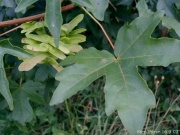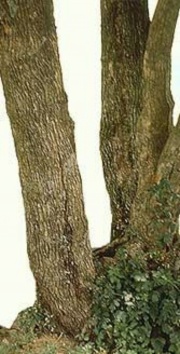Field maple
Jump to navigation
Jump to search
Description
A small, shrub-like, deciduous maple tree, Acer campestre, native to Europe, the Balkans, and Turkey. The field maple tree produces a pale, yellow-brown wood that is strong with an even grain (Gale et al 2000). It was used for boxes, utensils, furniture, tool handles, musical instruments, boats, wagons, and weapons.
Synonyms and Related Terms
Acer campestre; navr (Dan.); Feld-Ahorn (Deut.); érable champêtre (Fr.); Acer campestre (It.); Spaanse aak (Ned.); naverlönnen (Sven.); arce campestre (Esp.); bordo comum (Port.); hedge maple
Physical and Chemical Properties
- Height = 15-25m with low branches
- Bark = gray-brown with shallow ridges.
- Flowers = small yellow-green in spring
- Fruit = double samaras (two-winged seeds) at 180 degrees
- Color = Sapwood (most often used) is an off-cream color. Can have curly or quilted patterns
- Grain/Texture = straight grain with fine even texture
Working Properties
- Fairly easy to work with both hand and machine tools, though slightly more difficult than soft maple due to field maple’s higher density
- Has a tendency to burn when being machined with high-speed cutters such as in a router
- Turns, glues, and finishes well, though blotches can occur when staining, and a pre-conditioner, gel stain, or toner may be necessary to get an even color.
Resources and Citations
- The Wood Database: Field Maple
- R.Gale, P.Gasson, N.Hepper, G.Killen, "Wood" in Ancient Egyptian Materials and Technology, P.Nicholson, I.Shaw (eds.), Cambridge University Press, 2000, p. 334-371.
- Schoch, W., Heller, I., Schweingruber, F.H., Kienast, F., 2004:Wood anatomy of central European Species: Field Maple,Acer campestre L.
- Virginia Tech Dendrology at www.fw.vt.edu/dendro/denology/main.htm (Accessed Sept. 28, 2005)
- Wikipedia: http://en.wikipedia.org/wiki/Field_maple (Accessed Sept. 28, 2005)

